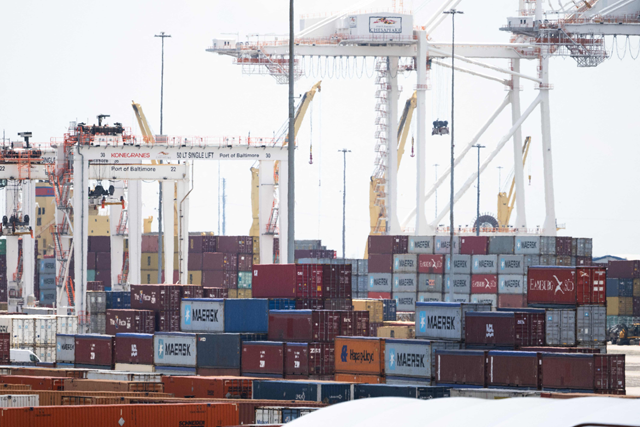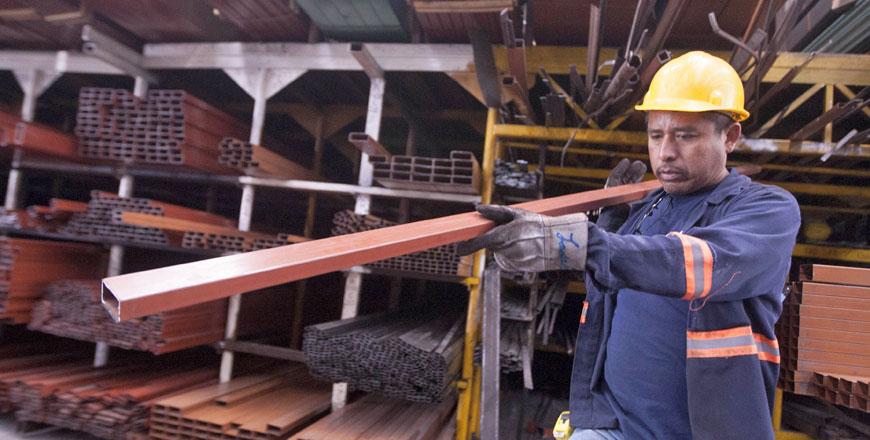You are here
Trump vows big tariffs on Mexico, Canada, China
By AFP - Nov 26,2024 - Last updated at Nov 26,2024

Cargo shipping containers and cranes are seen at cargo terminals as part of the Port of Baltimore in Baltimore, Maryland, June 12, 2024, following the reopening of the shipping channel in the Baltimore Harbor after the Francis Scott Key Bridge collapsed (AFP photo)
WASHINGTON — US President-elect Donald Trump said Monday he intends to impose sweeping tariffs on goods from Mexico, Canada and China in response to illegal drug trade and immigration.
In a series of posts to his Truth Social account, Trump vowed to hit some of the United States' largest trading partners with sweeping tariffs on all goods entering the country.
"On January 20th, as one of my many first Executive Orders, I will sign all necessary documents to charge Mexico and Canada a 25 per cent tariff on ALL products coming into the United States, and its ridiculous Open Borders," he wrote.
In another post, Trump said he would also be slapping China with a 10 per cent tariff, "above any additional Tariffs," on all of its products entering the US in response to what he said was its failure to tackle fentanyl smuggling.
Tariffs are a key part of Trump's economic agenda, with the Republican president-elect vowing wide-ranging duties on allies and adversaries alike while he was on the campaign trail ahead of his November 5 victory.
Trump's first term in the White House was marked by an aggressive and protectionist trade agenda that also targeted China, Mexico and Canada, as well as Europe.
While in the White House, Trump launched an all-out trade war with China, imposing significant tariffs on hundreds of billions of dollars of Chinese goods.
At the time he cited unfair trade practices, intellectual property theft, and the trade deficit as justifications.
China responded with retaliatory tariffs on American products, particularly affecting US farmers.
The US, Mexico and Canada are tied to a three-decade-old free trade agreement, now called the USMCA, that was renegotiated under Trump after he complained that the US businesses, especially automakers, were losing out.
"Mexico and Canada remain heavily dependent on the US market so their ability to walk away from President-elect Trump's threats remains limited," Wendy Cutler, vice president at the Asia Society Policy Institute, and former US trade official, told AFP.
"He would undoubtedly be challenged in US courts but that will take time to work through the legal process," she added.
By citing the fentanyl crisis and illegal immigration, Trump appeared to be using national security concerns as a means to break that deal, something that is allowed under the rules set by the World Trade Organization.
But most countries and the WTO treat national security exceptions as something to be used sparingly, not as a routine tool of trade policy.
Trump in 2018 cited national security justifications to impose tariffs on steel and aluminum imports that targeted close allies like Canada, Mexico, and the European Union.
This led to retaliatory measures from the trading partners.
'No cause of concern'
The EU ambassador to the United States on Friday said that Europe would be ready to respond in case of renewed frictions with the US over trade.
Shortly after Trump's victory, Mexican President Claudia Sheinbaum reassured her citizens that Trump's return was "no cause for concern" despite the virulent trade threats.
Many economists have warned that tariffs would hurt growth and push up inflation, since they are primarily paid by importers bringing the goods into the US, who often pass those costs on to consumers.
But those in Trump's inner circle have insisted that the tariffs are a useful bargaining chip for the US to push its trading partners to agree to more favorable terms, and to bring back manufacturing jobs from overseas.
Trump has said he will put his commerce secretary designate Howard Lutnick, a China hawk, in charge of trade policy.
Lutnick has expressed support for a tariff level of 60 per cent on Chinese goods alongside a 10 per cent tariff on all other imports.
Related Articles
WHISTLER, Canada — The EU on Friday launched its first counteroffensive against Washington's punishing steel and aluminum tariffs while the
WASHINGTON — US President Donald Trump plans to impose 25-percent tariffs on steel and aluminum imports from Monday, prompting the threat of
Washington — The clock is ticking down to Donald Trump's "Liberation Day" when the US president has threatened to unleash a wide range of ta


















